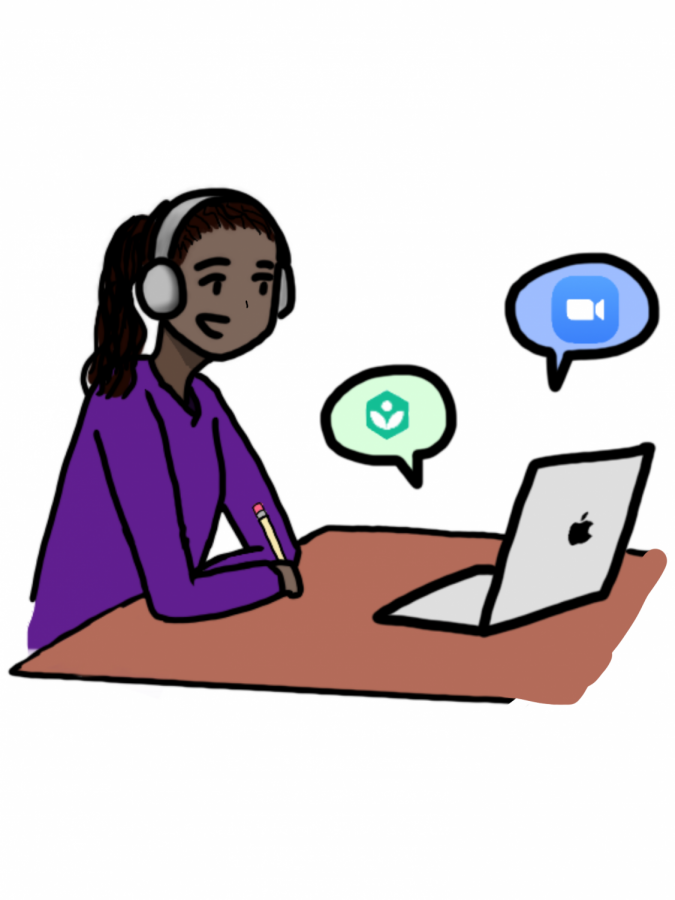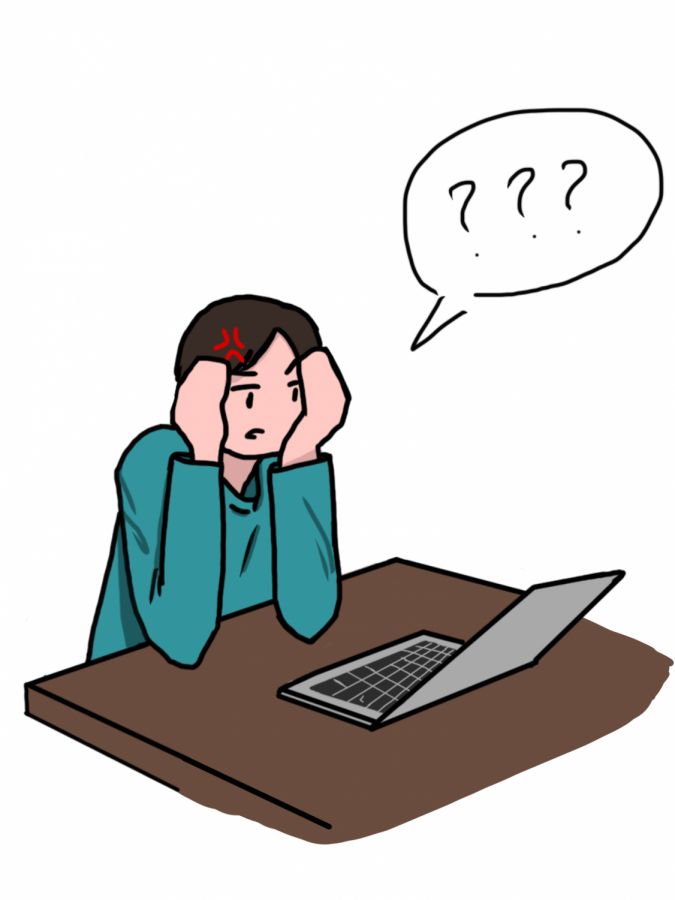B&G: Is MCPS successful in continuing education using online school?
June 3, 2020
The COVID-19 pandemic has shutdown countries worldwide and with many public areas closed, including schools, districts have had to find an alternative method to continue education. MCPS as well as many other areas have chosen online schooling as the best means to finish off the school year, but is it as good as traditional schooling? Read both sides to learn more:
Online school should become the new normal
In Mid-March, most students have been thankful for a well-needed break from school. But as weeks turned into months, it was clear an online form of education was necessary to finish the school year. And while online school is nothing new, it has never occurred for such a long period at this scale. Teachers and students alike have been adjusting to this new normal, but seeing the vast success of online school as well as its benefits, it should last much longer than a few months.
The transition to virtual learning was quickly executed. Teachers had all the resources required to engage students ranging from learning platforms like myMCPS canvas and google classroom along with zoom sessions. Additionally, MCPS helped to bridge the digital divide by providing Chromebooks to those who do not have reliable access to the internet, enabling all students to participate in distant learning.
Online learning gives students a taste of what they never had in a traditional school setting: freedom. Conventional school days start from around 7-8 a.m. and end at 2-3 p.m. in most places, leaving about seven hours for extracurriculars, sports, part-time jobs, homework and anything else a high school student struggles in. With online school, there is a full 16 hours for students to utilize and they have the freedom to allocate that time appropriately based on their needs and activities.
Teachers provide assignments, videos, zoom sessions and anything else a student may need to succeed and the student decides when they complete these assignments. This also teaches essential time-management skills as a student has full rein on what to do with their time instead of having a bell dictate what classes they will attend and when.
There is much more to a student’s life than school, but school and its associating homework take up most a student’s average day. Even though most activities and extracurriculars are postponed or canceled to adhere to social distancing, many have moved to video chat platforms like Zoom and Google Meet. Students can now dedicate a majority of their time doing things they are passionate about and work towards goals that school may have hindered them from achieving.
A major result of COVID-19 shutting down schools for the rest of the school year is MCPS’s decision to implement a pass/fail grading system for the fourth quarter. This system allows students to decide to either have a letter grade on their transcript or to simply have a pass on their transcript. The former choice would impact their grade point average (GPA) while the latter would not.
Students can choose what they think would be best for their grades depending on their situation. If this pandemic is nothing more than an extended summer break where the student has a lot of time to complete work and focus on academics, they can choose to have a grade. If the student may be going through a stressful situation because of the circumstances and can not devote themselves to school, they can still pass their classes with no repercussions.
Colleges would also be very understanding of what was going during the year of 2020, and would not penalize a student. It is a win-win situation for everyone. Students get some leeway for their grades and MCPS was able to compromise on grades.
Students can also learn at their own pace. According to a New York Times article, one of the biggest complaints students had about school is overcrowding. This leads teachers to have more students to teach and less time to individually focus on the student. Classes are fast-paced with a lot of information crammed into 45-90 minute sessions leaving students little to no time to take notes and process information, let alone ask clarifying questions.
With online learning, many teachers send pre-recorded lessons and slides which students can go through at their own pace. It is crucial to properly comprehend the lesson when it is first presented. Students can use a variety of resources such as textbooks, friends, and the internet to supplement lessons.
There is no right way to learn, every student is different which a traditional school structure and curriculum simply do not acknowledge. The freedom and possibility provided by online learning makes it flexible and adaptable to every student’s needs. MCPS along with a lot of parts of the country and world have found an efficient and valuable learning system that could be utilized for years to come.
Online school is a blanket policy that doesn’t help students
Graphic Courtesy of Graphics section
During COVID-19, parents have had both their parenting and working lives face dramatic changes.
When the COVID-19 quarantine started to stretch on from its initial two-week span, MCPS launched a distance learning system where teachers would assign work to be completed by students at home. May 12th also saw the launch pass/fail grading system for the fourth quarter, changing the grading format to help students achieve during this pandemic.
Given that every student is different, it is almost impossible to provide adequate instruction for all students using blanket policies and lessons such as those seen in MCPS. There is no way to replicate the setting of a classroom, both in the focus-conducive environment, or the ability for teachers to help students learn in an individualized way.
One place this deterioration is seen is in the value of assigned work. Some teachers seem to have given up on meaningful teaching and instead assign busywork. This is just giving students things to do that do not end up educating the students at all.
The other option teachers take is to assign actual work through a slideshow or a pre-recorded lesson. They then expect their students to absorb the information as though they were in class. Overall, the inadequate actions of teachers are just an effect of a county-wide policy that seemingly ignores the obvious limitations of distance learning.
It is hard to learn at home for some students. In school, everything is planned out to help students achieve academically and rid their environment of distractions. Students at home do not have the same privilege. Many have household responsibilities such as cooking, cleaning, or caring for siblings while childcare facilities remain closed.
Almost every student also has access to their phone, computer, gaming console, or even just the outdoors. In a Tide article about the popularity of TikTok, students noted how they were sometimes unable to complete their homework due to the almost addictive draw of the app. The issue with distance learning is that this draw is compounded.
Without an appropriate working environment, the allure of social media frequently distracts students from work. This helps to explain how many students find the information hard to absorb. Even with meaningful work being assigned, it can be difficult to learn and retain the information that they are being sent.
The new grading policy presents its own issues, with inflation being the most problematic. Currently, if a student passes fourth quarter, their semester grade can either be marked as one letter grade higher than their third quarter grade or simply as a pass. The effect of this is county-wide grade inflation. Students who can bump up their grades if they wish since the letter grades still factor into cumulative grade-point average, while those who are unsatisfied can take a pass, which does not impact GPA. This prevents equal treatment of all students and artificially creates higher grades.
Earning these grades is also called into question, considering that distance learning does not work. Students that receive a pass still may not understand the content they had supposedly learned, and this has whole hosts of long-term repercussions, such as preparedness and applications for college credit.
Overall, the MCPS response to the COVID-19 pandemic, while flawed, is understandable. Nobody was prepared for the lengths of time that have to be spent in quarantine, and just as we are adapting to our new lives at home, MCPS is adapting to teaching students who are unable to attend school.
That being said, one clear road that would’ve been better was to end the school year, as occurred in Washington DC. If that course of action had been taken, all students would kept on the same level of understanding. While it may require teaching review in the coming years, to cover potentially missed information, it also ensures that all students are on the same playing field.
Currently, students who understand their work, for whom distance learning is not an issue, can progress, but those who do not are tethered to the levels of knowledge they had before leaving school. If future classes are taught with the presumption that students learned things during quarantine, those same students are likely to have a much harder time learning and keeping up with their peers.
It is fundamentally unfair to punish students who are unable to learn at home due to outside factors, and as such, it is unfair to continue distance learning with the expectation that students will be able to grow and progress from it. At the very least, MCPS should be looking to institute curriculum- and county-wide review when school begins next year, to ensure that all students can pick back up from where they left off, and grow to be better learners.

